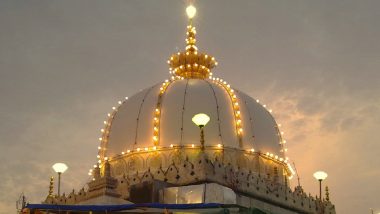Ajmer/New Delhi, November 28: ‘Worrisome', ‘painful', ‘what is the problem'… the rift over a claim that the famed shrine of Sufi saint Khwaja Moinuddin Chishti was built over a Shiva temple widened on Thursday with politicians, community leaders and others weighing in on the potentially volatile issue. On Wednesday, a local court in Ajmer, known the world over as home of the Mughal-era dargah visited by thousands of devotees cutting across religious divides every day, issued notices to the dargah committee, the Ministry of Minority Affairs and the Archaeological Survey of India on the plea seeking to declare the shrine a temple.
The notice came just days after four people were killed in Sambhal in Uttar Pradesh in violence following a local court ordering survey of another Mughal-era shrine, the Shahi Jama Masjid, which petitioners said was built after destroying an old temple. And set off fears that Ajmer could become another communal tinderbox. While dargah committee officials declined to comment, Syed Sarwar Chishti, secretary of the Anjuman Syed Zadgan, a body representing the khadims (caretakers) of the Ajmer dargah, described the petition as a deliberate attempt to fracture society along communal lines. Rajasthan Court Admits Petition Claiming Existence of Sankat Mochan Mahadev Temple Within Premises of Ajmer Sharif Dargah.
He said the dargah which he described as a symbol of communal harmony and secularism comes under the Minority Affairs ministry and the ASI has nothing to do with it. "The community accepted the decision in the Babri Masjid case and we believed nothing will happen after that but unfortunately such things are happening again and again. The example of Sambhal in Uttar Pradesh is in front of us. This must stop," he told PTI. He added that the Anjuman be made party to the case.
The plea seeking directions to start worship in the temple was filed in September and the next hearing is on December 20. "Our demand was that the Ajmer dargah be declared a Sankat Mochan Mahadev Temple and if the dargah has any kind of registration, it should be cancelled. Its survey should be done through ASI and Hindus should be given the right to worship there," plaintiff Vishnu Gupta told reporters.
The Hindu Sena president has referred to a book by academic Har Bilas Sarda to support his claim that there was a Shiv temple where the dargah was raised. He claimed he had conducted research for two years and found that there was a Shiva temple which was destroyed by Muslim invaders and a dargah built. As debate – and concerns – escalated, Union minister Giriraj Singh wondered why. Ajmer Dargah Row: Court Issues Notice Over Plea Claiming Shiva Temple in Ajmer Sharif in Rajasthan.
"A court has ordered survey in Ajmer. What is the problem if court has ordered a survey? This is a truth that when Mughals came to India, they demolished our temples. The Congress government has only done appeasement till now. If (Jawaharlal) Nehru would have stopped it in 1947 itself, there would have been no need to approach the court today," he said. Muzaffar Bharti, president of the United Muslim Forum Rajasthan (UMFR), contended that the petition was a "sheer violation" of the Places of Worship Act 1991.
He also noted that Prime Minister Narendra Modi offers a 'chadar' at the dargah during the annual Urs, a tradition started by Jawaharlal Nehru. AIMIM MP Asaduddin Owaisi agreed. "The Dargah Sharif has been there (Ajmer) for 800 years. Every prime minister of the country sends 'chadar' for the dargah during Urs. Where will all this stop? What will happen to Place of Worship Act 1991? This is being done to destabilise the country... I am saying this repeatedly that these things are not in favour of the country. These people are related directly or indirectly with BJP, RSS..."
PDP chief Mehbooba Mufti also cited the act. "Thanks to a former Chief Justice of India a Pandora's box has been opened sparking a contentious debate about minority religious places. Despite a Supreme Court ruling that the status quo should be maintained as it existed in 1947, his judgement has paved the way for surveys of these sites potentially leading to increased tension between Hindus and Muslims," said PDP president Mehbooba Mufti. The former Jammu and Kashmir chief minister claimed that the Sambhal violence was the direct result of this judgment.
She was apparently referring to an order by a bench led by then CJI D Y Chandrachud allowing the ASI to conduct a scientific survey of the Gyanvapi mosque in Varanasi to determine if it was built on a pre-existing temple. The Places of Worship (special provisions) Act, 1991 fixed August 15, 1947 as the cut-off date for status quo on the character of religious places. The Supreme Court in August last year refused to stay Allahabad High Court order allowing an ASI survey at the Gyanvapi mosque complex, thereby opening the door to disputes such as the one in Sambhal and in Mathura. The bench comprising then CJI Chandrachud and Justices J B Pardiwala and Manoj Misra, however, asked the ASI to carry out the survey through "non-invasive methodology".
"Yet another shocker.. supposedly hidden somewhere in the Ajmer Dargah Sharif," added People's Conference president Sajad Gani Lone on the developments in Ajmer. "Worrisome. The latest claim: Shiv Temple at Ajmer Dargah. Where are we taking this country? And why? For political dividends!" Rajya Sabha MP Kapil Sibal said in a post on X. "These things are very painful. Some people have their cool after 2024 (Lok Sabha) election results as they didn't get the majority. These people want to target a particular community to please the majority,” added Samajwadi Party MP Mohibbullah Nadvi.
Khwaja Moinuddin Chishti was a Sufi saint from Persia who made Ajmer his home. The shrine in his honour was built by Mughal emperor Humayun. During his reign, Mughal ruler Akbar made a pilgrimage to Ajmer every year. He, as well as Shah Jahan, built mosques inside the shrine complex.













 Quickly
Quickly


